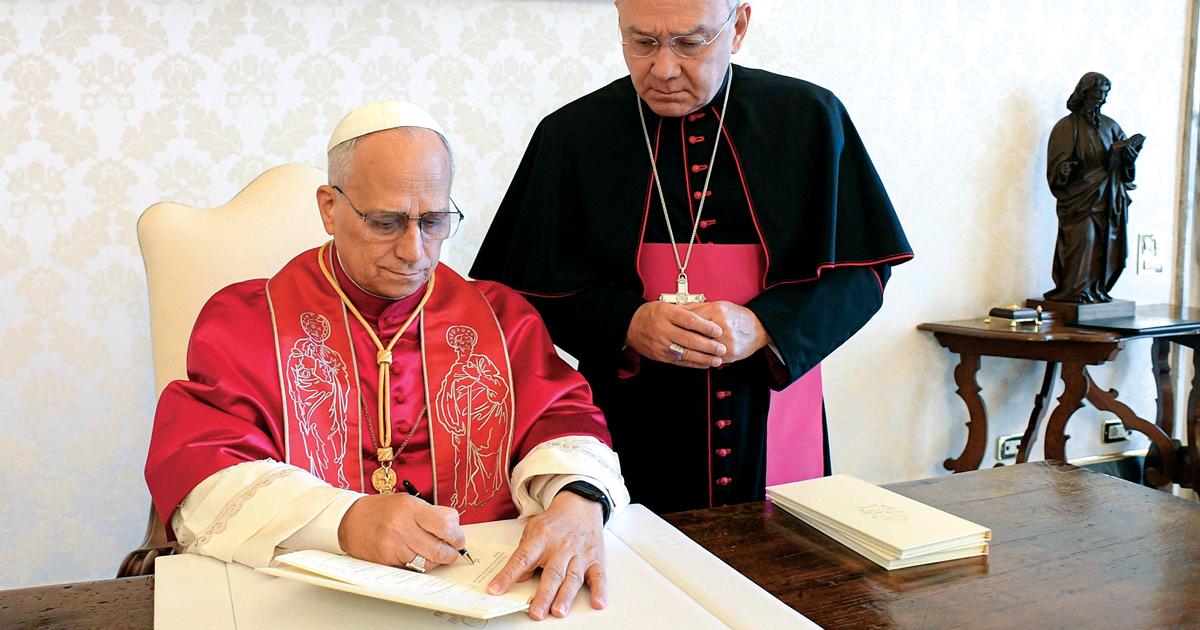If you close your ear to the cry of the poor,
You will cry out and not be heard.
Proverbs 21: 13
Advertisement
If readers of Pope Leo the XIV’s first apostolic exhortation, Dilexi te (‘I have loved you’) detect an echo of the late Pope Francis in the document they would not be wrong. The work, signed on the October 4 by Pope Leo, was originally written by Pope Francis before he died and was subsequently revised and approved by our new pontiff. Mgr. Pierre Goudreault, president of the Canadian Conference of Catholic Bishops, puts it rather charmingly: the document has ‘Pope Francis’ flavour with Pope Leo’s seasoning.’
In every sense, this latest exhortation is very much a bridge document, celebrating the passion that Pope Francis had for those on the margin with a commitment that our new pope shares deeply. “I am happy to make this document my own,” he tells us, “adding some reflections — and to issue it at the beginning of my own pontificate, since I share the desire of my beloved predecessor that all Christians come to appreciate the close connection between Christ’s love and his summons to care for the poor.”
This is a timely document, one that argues for the dignity of every human person, but with an emphasis, as is so often the case for both pontiffs, on the sacred uniqueness of the poor, of the migrant, of the unwanted. Like the well-known hymn, the exhortation demands that we hear the cry of the poor, but it does so by asking not for our pity, but our understanding that the poor must walk among us as equals. Indeed, and mirroring the Gospels, the document insists that they are Christ’s favoured ones, and we do them an injustice not to recognize and honour how they embody Jesus himself. As Pope Leo puts it, “in this call to recognize him in the poor and the suffering, we see revealed the very heart of Christ, his deepest feelings and choices, which every saint seeks to imitate.”
Advertisement
The exhortation, of course, does not ask saints but each one of us to do more to acknowledge the privileged dignity of those most wounded in our community. “Christian holiness often flourishes in the most forgotten and wounded places of humanity. The poorest of the poor—those who lack not only material goods but also a voice and the recognition of their dignity. It is these that ‘have a special place in God’s heart.” Through the wounded, “Christ continues to suffer and rise again.”
Dilexi te asks us to care for migrants at a time when they seem to be most rejected globally, reminding us that the ‘experience of migration accompanies the history of the people of God.’
The wide-ranging document identifies the virtues of the religious orders and the power of women as champions of justice and the faith. It speaks of the importance of caring for the sick, of championing the release of prisoners, of alms-giving — and acknowledges the importance of education as “one of the highest expressions of Christian charity.”
It makes the important connection between freedom from poverty and the crucible of education, providing examples of how the faithful —especially female congregations and religious sisters — have brought the mission of education to those on the margins.” One phrase resonates in particular: “the education of the poor is not a favor but a duty.”
Advertisement
At a recent talk at Corpus Christi College, the famed Jesuit priest Fr. Geoffrey Boyle, foreshadowed much said in Dilexi te. Speaking about scholarships that have been established at the college to support those most in need, Fr. Boyle noted, “You go from here in your support of Corpus Christi College to dismantle the barriers that exclude. You go to the margins and stand there because the only way they’ll get erased is if you don’t stand out with them.” He powerfully reminded us that, “Every once in a while, you get this amazing privilege to be able to stand with the easily despised and the readily left out. You get to stand with the demonized so the demonizing will stop — and with the disposable so that the day will come when we stop throwing people away.”
Dilexi te makes this argument emphatically and eloquently. The voices of two beloved popes join to insist we hear the cry of the poor. Isn’t it time we listen?
(Turcotte is President and Vice-Chancellor at St. Mark’s and Corpus Christi College, University of British Columbia.)
A version of this story appeared in the November 02, 2025, issue of The Catholic Register with the headline “Two papal voices join the margins”.
